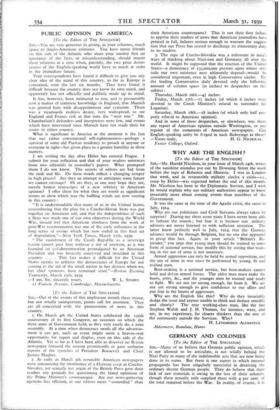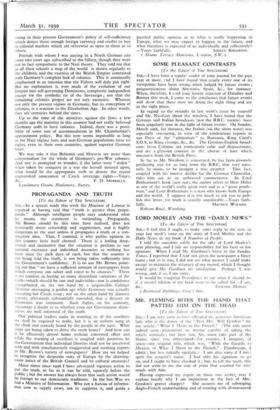GERMANY AND COLONIES
[To the Editor of THE SPECTATOR] SIR,—Many of us believe that German public opinion, which is not allowed to be articulate, is not solidly behind the Nazi Party in many of the indefensible acts that are now being done in its name. But there is one aspect in which internal propaganda has been singularly successful in deceiving the ordinary decent German people. They do believe that their lack of raw materials is owing to the loss of their colonies. though these actually only supplied them with 4 per cent. of the total required before the War. In reality, of course, it is
owing to their present Government's policy of self-sufficiency which denies them enough foreign currency and credits to buy in colonial markets which are otherwise as open to them as to others.
Friends .with whom I was staying in a North German city some two years ago subscribed to the fallacy, though they were not in fact sympathetic to the Nazi theory. They told me that in all their schools a map of the world is shown regularly to the children, and the vastness of the British Empire contrasted with Germany's complete lack of colonies. This is continually emphasised as an injustice that the Fiihrer will duly put right. But no explanation is ever made of the evolution of our Empire into self-governing Dominions, completely independent except for the symbolic tie of the Sovereign ; nor that the remaining colonies proper are not very extensive. Whereas not only the present regime in Germany, but its conception of colonies, is a reaction to the Elizabethan Age. In other words, they are centuries behind the times.
Up to the time of the atrocities, against the Jews a few months ago the majority in this country had not really believed Germany unfit to have colonies. Indeed, there was a possi- bility of some sort of accommodation in Mr. Chamberlain's appeasement policy. But this now seems impossible as long as the Nazi regime lasts and non-German populations have no rights, even in their own countries, against superior German force.
We may take it that Bohemia and Moravia are more than compensation for the whole of Germany's pre-War colonies. And one is prompted to wonder, if the latter were " stolen " when taken by conquest in a war she herself insisted upon, what would be the appropriate verb to denote the recent unprovoked annexation of Czech sovereign rights.—Yours,



































































 Previous page
Previous page